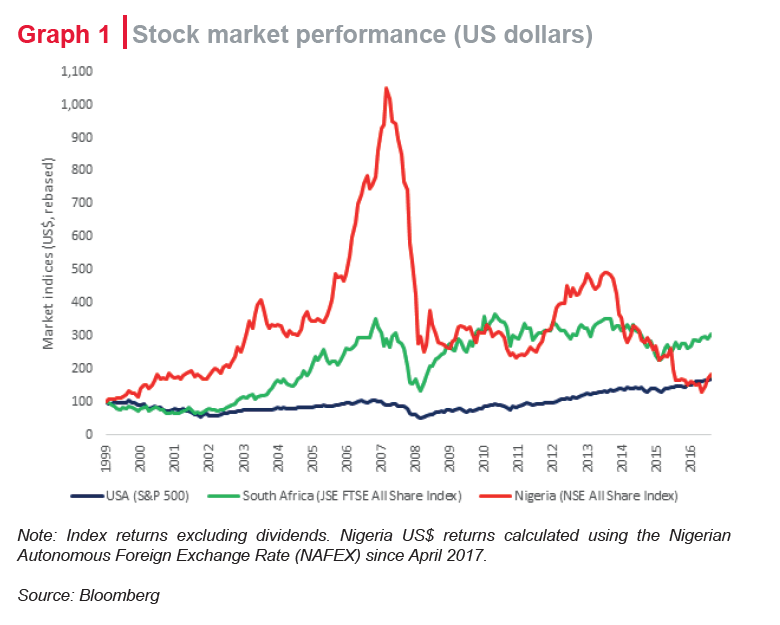Varied narratives
Active managers in Africa and frontier markets have to counter the perceived higher-risk of investing in volatile markets prone to political and economic uncertainty. In response, most investors gravitate to growth strategies, pursuing markets or sectors with attractive GDP growth prospects and predictable policy makers. Inevitably, when investors flock to the preferred country or sector, the top-rated companies command a premium valuation, often justified as buying ’growth at a reasonable price’.
In contrast, value investors hardly have compelling narratives to justify why they are seeking out the least popular markets and acting with conviction when loading up on beaten-down value stocks. The risk of appearing stupid increases as market prices are trending downwards and there is no shortage of ‘cheap for a reason’ arguments. Despite the rigorous analysis, a value manager’s judgment and conviction is tested when the strategy underperforms. The prospect of client withdrawals is a reality check.
The price you pay counts
Empirical data over long time periods and across multiple markets suggests that stock market returns aren’t correlated to economic growth prospects. What matters is the price you pay or starting valuations. This is no different in Nigeria, currently the largest country weighting in the Allan Gray Africa ex-SA Equity and Bond Funds, which comprise together about 2% of the Allan Gray Balanced Fund.
President Olusegun Obasanjo’s election in 1999 marked a fundamental transition from military rule to democracy. Nigeria had experienced only 10 years of civilian rule from independence in 1960 to 1999. Since then, Nigeria’s relative political stability, combined with a boom in oil prices, fuelled 9.2% growth in GDP per capita compounded annually; whereas growth in South Africa was 3.2% and in the US it was 3.0%. Over the same 17 year period to 2016, Nigeria’s stock market returned 2.8% (in US dollars), whereas South Africa and the S&P 500 delivered 6.0% and 2.5% respectively, as shown in Graph 1.
But the real story is the period between the bookends. The notable high volatility in Nigeria’s stock market has offered investors greater opportunities to generate superior returns – by patiently buying stocks that thrived when political or economic prospects appeared dim; and selling the popular stocks when other investors were overly optimistic.
The investment case for Nigerian equities
The investment case for Nigerian equities was quite bleak at the beginning of 2017. Nigeria’s oil production had slumped to the lowest level in over 26 years as militant attacks in the Niger Delta crippled key pipeline installations. This increased the pressure on the currency still reeling from the collapse in oil prices. Policymakers had imposed capital controls and were rationing scarce dollars. Inevitably, rent-seeking replaces most productive activities when an economy has 11 to 13 different rates for buying a US dollar. Foreign investors, unable to repatriate existing funds, shunned Nigerian equities.
Domestic investors were also underweight equities with treasury bills yielding about 22%. At the end of December 2016, Nigerian pension funds had the lowest historical allocation to equities at 8%, and highest allocation to fixed income instruments at 72%.
With few buyers, Nigeria’s equity market index was trading near its lowest levels since 2000 (in US$). An index of the top 10 Nigerian banks was trading at 4x price-to-earnings ratio and 0.6x price-to-book. To be sure, not all Nigerian banks may survive this crisis, but most of the top tier banks appeared well positioned with adequate capital buffers and provisioning for potential bad loans.
Nigeria’s equity market has surged 42% in US dollars since the bottom at the end of April 2017. Market confidence has rebounded following the introduction of a new foreign exchange regime. Oil production is on a steady recovery path and US dollars are more readily available. Nigeria’s challenges won’t be resolved overnight, but the outlook is promising and investors are coming back. There is still ample headroom for valuations to recover.
As Nigeria illustrates, value investing requires patient capital and a rigorous analysis of bottom-up stock picks. Paradoxically, a disciplined value investing approach protects investors in markets where the underlying growth drivers – political stability and commodity cycles – are inherently unpredictable. Paying up for ‘growth at a reasonable price’ reduces your margin of safety when things go wrong. For us, the risk of appearing stupid is far more tolerable than the risk of permanent capital loss.
